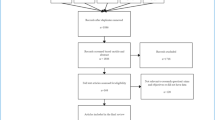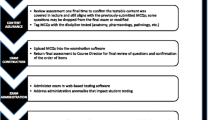Abstract
Completing frequent quizzes can improve exam scores; however, there is a lack of research on variables that influence quiz accuracy and whether there is an effect on exam scores. This study evaluated the effects of a contingency for quiz accuracy on quiz accuracy and exam performance. Eighty-one students enrolled in an introductory Learning course participated. For each class meeting and its related readings, the instructor assigned an online quiz due just before each class. During the no-contingency condition, the instructor assigned quizzes, but quiz accuracy did not result in points toward the final grade. During the accuracy-contingency condition, students earned points based on quiz accuracy. In a reversal design, the accuracy-contingency increased quiz accuracy and exam scores relative to no-contingency. Although many students benefited from the contingency, low-performing students were least likely to show a meaningful improvement in exam scores.


Similar content being viewed by others
Change history
02 April 2018
This article was updated with the correct version of Figure 1. Due to an error in production, an older version of Figure 1 was used; Springer regrets the error.
References
Azorlosa, J. L. (2011). The effect of announced quizzes on exam performance: II. Journal of Instructional Psychology, 38, 3–7.
Boyce, T. E., & Hineline, P. N. (2002). Interteaching: a strategy for enhancing the user friendliness of behavioral arrangements in the college classroom. The Behavior Analyst, 25, 215–226.
Burchfield, C. M., & Sappington, J. (2000). Compliance with required reading assignments. Teaching of Psychology, 27, 58–60.
Daniel, D. B., & Broida, J. (2004). Using web-based quizzing to improve exam performance: Lessons learned. Teaching of Psychology, 31, 207–208.
Geiger, O. G., & Bostow, D. E. (1976). Contingency-managed college instruction: Effects of weekly quizzes on performance on examination. Psychological Reports, 39, 707–710.
Graham, R. B. (1999). Unannounced quizzes raise test scores selectively for mid-range students. Teaching of Psychology, 26, 271–273.
Johnson, B. C., & Kiviniemi, M. T. (2009). The effect of online chapter quizzes on exam performance in an undergraduate social psychology course. Teaching of Psychology, 36, 33–37.
Michael, J. (1991). A behavioral perspective on college teaching. The Behavior Analyst, 14, 229–239.
Mulryan-Kyne, C. (2010). Teaching large classes at college and university level: challenges and opportunities. Teaching in Higher Education, 15, 175–185.
Narloch, R., Garbin, C. P., & Turnage, K. D. (2006). Benefits of prelecture quizzes. Teaching of Psychology, 33, 109–112.
Rehfeldt, R. A., Walker, B., Garcia, Y., Lovett, S., & Filipiak, S. (2010). A point contingency for homework submission in the graduate school classroom. Journal of Applied Behavior Analysis, 43, 499–502.
Ryan, C. S., & Hemmes, N. S. (2005). Effects of the contingency for homework submission on homework submission and quiz performance in a college course. Journal of Applied Behavior Analysis, 38, 79–88.
Skinner, B. F. (1968). The technology of teaching. Massachusetts: Copley Publishing Group.
Sturmey, P., Dalfen, S., & Fienup, D. M. (2015). Inter-teaching: a systematic review. European Journal of Behavior Analysis, 16, 121–130.
U.S. Department of Education (2017). College Scorecard: CUNY Queens College. Retrieved from: https://collegescorecard.ed.gov/school/?190664-CUNY-Queens-College
Ventura, S., & Onsman, A. (2009). The use of popular movies during lectures to aid the teaching and learning of undergraduate pharmacology. Medical Teacher, 31, 662–664.
Acknowledgments
This research was conducted by the first author in partial fulfillment of a Ph.D. in Psychology (behavior analysis concentration) through the Graduate Center, CUNY.
A portion of Dr. Fienup’s work was completed while affiliated with Queens College and The Graduate Center, CUNY.
Author information
Authors and Affiliations
Corresponding author
Ethics declarations
The research was determined to be exempt by the institutional review board of the affiliated university.
Conflict of Interest
The authors declare that they have no conflict of interest.
Additional information
The original version of this article was revised: This article was updated with the correct version of Figure 1.
• Frequent quizzes improve student’s exam scores
• Instructors can arrange accuracy-contingencies to increase student accuracy and completion of quizzes
• Contingencies are necessary to increase student accuracy and completion of quizzes
• Accuracy-contingencies on quizzes help all student but had the least effect with low-performing students
Rights and permissions
About this article
Cite this article
Dalfen, S.R., Fienup, D.M. & Sturmey, P. Effects of a Contingency for Quiz Accuracy on Exam Scores. Behav Analysis Practice 11, 106–113 (2018). https://doi.org/10.1007/s40617-018-0226-z
Published:
Issue Date:
DOI: https://doi.org/10.1007/s40617-018-0226-z




